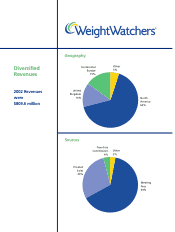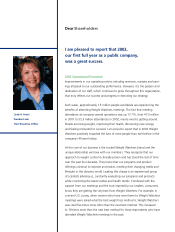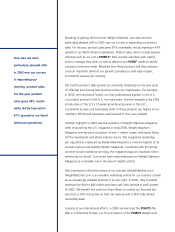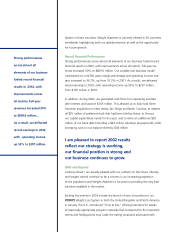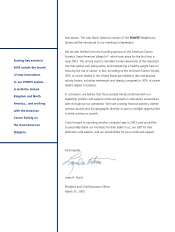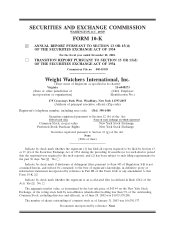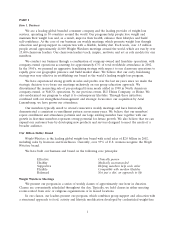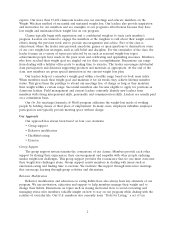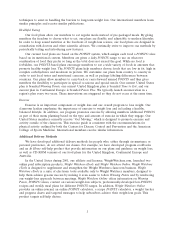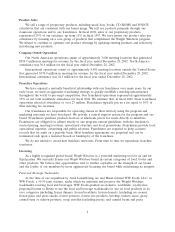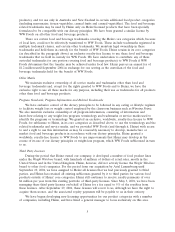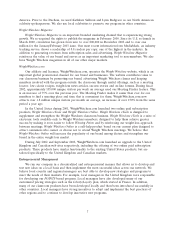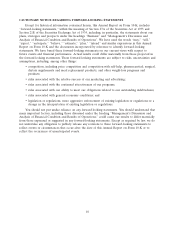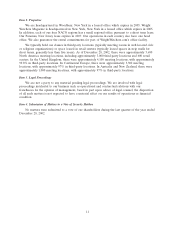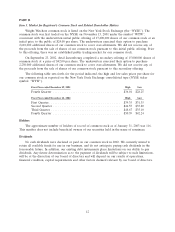WeightWatchers 2002 Annual Report Download - page 9
Download and view the complete annual report
Please find page 9 of the 2002 WeightWatchers annual report below. You can navigate through the pages in the report by either clicking on the pages listed below, or by using the keyword search tool below to find specific information within the annual report.experts. Our more than 15,400 classroom leaders run our meetings and educate members on the
Weight Watchers method of successful and sustained weight loss. Our leaders also provide inspiration
and motivation for our members and are examples of our program’s effectiveness because they have
lost weight and maintained their weight loss on our program.
Classes typically begin with registration and a confidential weigh-in to track each member’s
progress. Leaders are trained to engage the members at the weigh-in to talk about their weight control
efforts during the previous week and to provide encouragement and advice. Part of the class is
educational, where the leader uses personal anecdotes, games or open questions to demonstrate some
of our core weight-loss strategies, such as self-belief and discipline. For the remainder of the class, the
leader focuses on a variety of topics pre-selected by us, such as seasonal weight-loss topics,
achievements people have made in the prior week and celebrating and applauding successes. Members
who have reached their weight goal are singled out for their accomplishment. Discussions can range
from dealing with a holiday office party to making time to exercise. The leader encourages substantial
class participation and discusses supporting products and materials as appropriate. At the end of the
class, new members are given special instruction in our current weight loss plan.
Our leaders help set a member’s weight goal within a healthy range based on body mass index.
When members reach their weight goal and maintain it for six weeks, they achieve lifetime member
status. This gives them the privilege to attend our meetings free of charge as long as they maintain
their weight within a certain range. Successful members also become eligible to apply for positions as
classroom leaders. Field management and current leaders constantly identify new leaders from
members with strong interpersonal skills, personality and communication skills. Leaders are usually paid
on a commission basis.
Our On Site meetings (formerly At Work) program addresses the weight-loss needs of working
people by holding classes at their place of employment. In many cases, employers subsidize employee
participation and typically provide meeting space without charge.
Our Approach
Our approach has always been based on four core elements:
•Group support
•Behavior modification
•Healthful eating
•Exercise
Group Support
The group support system remains the cornerstone of our classes. Members provide each other
support by sharing their experiences, their encouragement and empathy with other people enduring
similar weight-loss challenges. This group support provides the reassurance that no one must overcome
their weight-loss challenges alone. Group support assists members in dealing with issues such as
emotional-eating and finding time to exercise. We facilitate this support through interactive meetings
that encourage learning through group activities and discussions.
Behavior Modification
Behavior modification and education on eating habits have also always been key elements of our
program. We use motivation, education and support to help members manage their weight and to
change their habits. Discussions on topics such as staying motivated, how to avoid overeating and
managing stress offer members valuable insight on how to stay on our program while dealing with the
realities of everyday life. Our U.S. members also currently learn ‘‘Tools for Living,’’ a set of ten
2


